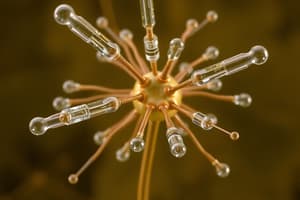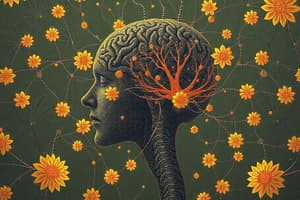Podcast
Questions and Answers
Which of the following medications is classified as an opioid pain medication?
Which of the following medications is classified as an opioid pain medication?
- Celecoxib – Celebrex
- Ibuprofen
- Fentanyl - Sublimaze (correct)
- Naproxen
What is a common side effect associated with opioid pain medications?
What is a common side effect associated with opioid pain medications?
- Increased GI peristalsis
- Enhanced alertness
- Elevated blood pressure
- Decreased urinary output (correct)
Which medication is used as an antidote for opioid overdose?
Which medication is used as an antidote for opioid overdose?
- Hydromorphone
- Aspirin
- Naloxone (correct)
- Celecoxib
What condition is NOT an indication for the use of anti-inflammatory medications?
What condition is NOT an indication for the use of anti-inflammatory medications?
Which of the following NSAIDs specifically inhibits COX-2 enzymes?
Which of the following NSAIDs specifically inhibits COX-2 enzymes?
What role does the peripheral nervous system (PNS) play in the nervous system?
What role does the peripheral nervous system (PNS) play in the nervous system?
Which neurotransmitter is primarily affected by benzodiazepines?
Which neurotransmitter is primarily affected by benzodiazepines?
Which of the following is NOT an indication for benzodiazepine use?
Which of the following is NOT an indication for benzodiazepine use?
What is a key characteristic of benzodiazepines in treating anxiety?
What is a key characteristic of benzodiazepines in treating anxiety?
What effect does the abrupt discontinuation of benzodiazepines after prolonged use have?
What effect does the abrupt discontinuation of benzodiazepines after prolonged use have?
How do benzodiazepines mainly reduce anxiety?
How do benzodiazepines mainly reduce anxiety?
What precaution should be taken when administering benzodiazepines to a patient?
What precaution should be taken when administering benzodiazepines to a patient?
Which of the following medications is classified as a benzodiazepine?
Which of the following medications is classified as a benzodiazepine?
What is the primary role of COX-2 in relation to anti-inflammatory drugs?
What is the primary role of COX-2 in relation to anti-inflammatory drugs?
Which of the following is NOT a consideration for NSAIDs?
Which of the following is NOT a consideration for NSAIDs?
What is one of the mechanisms through which acetaminophen reduces fever?
What is one of the mechanisms through which acetaminophen reduces fever?
Which of the following conditions is acetaminophen indicated for?
Which of the following conditions is acetaminophen indicated for?
What is the primary mechanism of action for lidocaine as a local anesthetic?
What is the primary mechanism of action for lidocaine as a local anesthetic?
What should be monitored for a patient taking acetaminophen?
What should be monitored for a patient taking acetaminophen?
What effect might an overdose of acetaminophen have on the liver?
What effect might an overdose of acetaminophen have on the liver?
Which of the following is NOT a consideration for administering lidocaine as a local anesthetic?
Which of the following is NOT a consideration for administering lidocaine as a local anesthetic?
What are mu receptors primarily responsible for in relation to pain management?
What are mu receptors primarily responsible for in relation to pain management?
Which medication acts as the antidote for an acetaminophen overdose?
Which medication acts as the antidote for an acetaminophen overdose?
What is a common undesirable effect of using NSAIDs?
What is a common undesirable effect of using NSAIDs?
Flumazenil is used primarily to reverse which effect?
Flumazenil is used primarily to reverse which effect?
What is the relationship between lidocaine and ventricular arrhythmias?
What is the relationship between lidocaine and ventricular arrhythmias?
Which of the following describes a common misconception about pain management?
Which of the following describes a common misconception about pain management?
How do opioid agonists primarily alleviate pain?
How do opioid agonists primarily alleviate pain?
Which of the following effects is associated with kappa receptors?
Which of the following effects is associated with kappa receptors?
Flashcards are hidden until you start studying
Study Notes
Nervous System
- Controls body functions.
- Composed of the CNS and PNS.
- PNS includes sensory receptors that send information to the CNS and motor nerves that carry information away.
- Operates through electrical impulses and chemical messengers for transmitting information in response to stimuli.
- Drug therapy often targets receptor sites and neurotransmitter release, uptake, and breakdown.
Anxiety
- Feeling of tension, nervousness, apprehension, or fear with unpleasant reactions to stimuli.
- Benzodiazepines reduce anxiety by inducing calm, drowsiness, and sleep.
- Benzodiazepines facilitate GABA (gamma-aminobutyric acid) binding at GABA receptors in the CNS.
Anxiety Medications
- Benzodiazepines are used to prevent anxiety without sedation.
- Indicated for anxiety disorders, alcohol withdrawal, hyperexcitability/agitation, seizure disorders, insomnia, and pre-operative anxiety relief.
- Common Benzodiazepines:
- Alprazolam (Xanax)
- Diazepam (Valium)
- Lorazepam (Ativan)
- Drugs in this class often end in "lam" or "pam."
Considerations for Anti-anxiety Medications
- Avoid abrupt discontinuation after prolonged use.
- Do not administer to patients with renal or hepatic dysfunction, history of drug abuse, or low blood pressure.
- Monitor for drowsiness, dizziness, and decreased blood pressure.
- Enhance the action of GABA (inhibitory transmitter).
- Teach patients to rise slowly from a supine position.
- Avoid alcohol.
- Flumazenil is a benzodiazepine antagonist that can reverse sedation.
Local Anesthetics
- Lidocaine is a local anesthetic used to prevent pain for a specified time frame.
- Acts as a powerful nerve block, temporarily interrupting nerve impulse production and conduction.
- Typically applied directly to the painful area.
Lidocaine: Pain Medication/Anesthetic/Anti-arrhythmic
- As an anesthetic, it acts on the CNS to produce sedation and sleep before procedures.
- As a local anesthetic, it inhibits nerve impulses from sensory nerves.
- Indications: Pain management for dental procedures and minor surgeries.
- Monitor vital signs and protect the numbed area from injury.
- As an anti-arrhythmic, it treats ventricular arrhythmias like ventricular tachycardia and fibrillation.
- Monitor EKG (electrocardiogram) and vital signs.
- Do not mix with amphotericin B or cefazolin.
Pain
- Sensory and emotional experience associated with potential tissue damage.
- Difficult for patients to cope with.
- Pain medications work in the CNS (brain and spinal cord) to alter pain impulse processing from peripheral nerves.
Pain Medications: Opioid Agonists
- Inhibit pain transmission by mimicking the body's natural pain control mechanisms.
- Increase the pain threshold.
- Act on mu and kappa opioid receptors.
- Mu receptors are primarily responsible for pain blocking, respiratory depression, euphoria, decreased GI activity, pupil constriction, and physical dependence.
- Kappa receptors are associated with some analgesia, pupil constriction, sedation, and dysphoria.
- Indicated for moderate to severe pain and pre-operative medication.
Opioid Pain Medications
- Codeine
- Fentanyl (Sublimaze)
- Hydromorphone (Dilaudid)
- Morphine (MS Contin)
- Oxycodone (Oxycontin, Roxicondone)
- Methadone (Dolophine)
Pain Medication Considerations: The 6 Ds
- Depressed respirations
- Dizziness
- Drowsiness
- Decreased GI peristalsis and urine output
- Decreased blood pressure
- Drug dependence
- Naloxone (Narcan) is an opioid antagonist that can rapidly reverse opioid overdose.
Anti-inflammatory Medications
- Inhibit prostaglandin synthesis by inhibiting the enzyme cyclooxygenase.
- Result in analgesic, anti-inflammatory, and antipyretic (fever-reducing) activities.
- Indicated to reduce fever, inflammation, and pain associated with musculoskeletal disorders (rheumatoid arthritis, osteoarthritis), and mild to moderate pain.
Nonsteroidal Anti-inflammatory Drugs (NSAIDs)
- Cox-1:
- Acetylsalicylic acid (Aspirin)
- Ibuprofen (Motrin, Advil)
- Diclofenac (Voltaren)
- Meloxicam (Mobic)
- Naproxen (Aleve)
- Cox-2:
- Celecoxib (Celebrex)
Mechanism of Action for Cox-1 and Cox-2
- Cyclooxygenases (COX-1 and COX-2) are enzymes that convert arachidonic acid into prostaglandins and other lipid mediators.
- COX-2 is induced by inflammatory stimuli and is considered a suitable target for anti-inflammatory drugs.
Indications for Cox-1 and Cox-2
- NSAIDs reduce prostaglandin production, which promotes inflammation, pain, and fever.
Considerations for NSAIDs:
- Avoid alcohol.
- Monitor for:
- Birth defects
- Bone marrow depression
- Increased GI distress
- Renal toxicity
- Tinnitus
- Hepatotoxicity
- Take with food.
- Discontinue 5-7 days before surgery.
- No specific antidote for NSAIDs.
Acetaminophen (Tylenol)
- Nonopioid analgesic/antipyretic
- A selective COX-2 inhibitor
- Mechanism of action:
- Relieves pain by raising the body's pain threshold.
- Reduces fever by eliminating excess heat through the hypothalamus.
- Blocks pain receptors in the brain.
Acetaminophen Indications
- Relieve mild to moderate pain:
- Headaches
- Muscle aches
- Menstrual cramps
- Colds/sore throats
- Toothaches
- Backaches
- Vaccination reactions
- Reduce fever
Acetaminophen Nursing Considerations
- Monitor for diaphoresis (sweating), tachycardia (rapid heart rate), and malaise (general discomfort).
- Recommend one glass of water with each dose.
- Muco-myst (acetylcysteine) is the antidote for overdose.
- Errors in dosing can cause liver damage.
- Use cautiously in patients with renal disease, alcohol abuse, or hepatic disease.
Studying That Suits You
Use AI to generate personalized quizzes and flashcards to suit your learning preferences.




